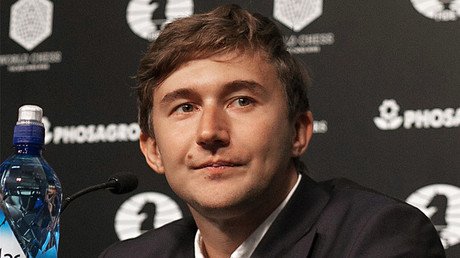‘Lucky’ American triumphs in Russia’s ‘chess diplomacy’ tournament
An ordinary US federal government employee won a prestigious invitation-only chess tournament set up by diplomats to improve international relations between Russia, Norway and the US after coming in as a last minute replacement for another player.
“I got incredibly lucky, I am not a master, I don’t speak Russian. But I knew someone else with good connections, but he had to go out of town, so he asked me to go in his stead. And it just worked!” said David Sherman after winning first prize in the ‘Chess for Peace’ tournament at the Russian embassy in DC on Saturday night.
Sherman, a keen amateur player, said he’d never even been to an embassy before and thought his chances of winning were just “fantasies” when he saw the caliber of his rivals in the 60-player field. But with no pressure he “had a blast” moving up the leaderboard.
Winners of the #chess diplomacy tournament! pic.twitter.com/wKp0s2y8MF
— RT America (@RT_America) May 13, 2017
With the first prize a round-trip ticket to Russia, Sherman was asked if, with Moscow always in the headlines, his winning destination would impede his career progress as a government employee.
“People are people, politics are politics, but right now I'm a chess player so these things don't bother me at all. I've always wanted to go, out of a whole lot of places Russia's on the top of my list. I'm a chess player, where am I supposed to go? To Tuscaloosa, Alabama? No, I go to Russia," Sherman told RT.
Quite a few children playing (and winning) at the #chessdiplomacy tournament pic.twitter.com/zwpc0vNV8V
— RT America (@RT_America) May 13, 2017
“I’m ecstatic! I always wanted to go to Russia, but it never could work out, it’s an expensive trip and it’s a long way, and you have to take leave. But now I’m going! It’s a dream come true, it really is.”
Allard Postma, financial counselor at the Netherlands Embassy, came second, while RT’s own Samir Shakhbaz shared the third place with Oleg Merkulov of Latvia. All received signed chessboards from World Champion, Norwegian Magnus Carlsen and the man he defeated to retain the title last year, Russia’s Sergey Karjakin.
But the tournament wasn’t so much about tangible rewards. It is the brainchild of Edward Lozansky, the President of the American University in Moscow, who said the failures of international diplomacy left him looking for alternative ideas.
"To say the least, relations between the Russian Federation and the United States are not very good. Perhaps we should start with a game of chess and follow China's example and Henry Kissinger's advice," said Lozansky, who said his “stole” the idea of “ping pong diplomacy” in which US and Chinese table tennis players competed against each other in the 1970s, paving the way for negotiations between their countries’ leaders.
The idea was keenly supported by Russia’s Ambassador to the US, Sergey Kislyak, who in turn recruited Norway’s Ambassador Kare Aas.
“It is a wonderful idea to bring people from different walks of life from different countries,” Kislyak told RT, noting with a smile that two other ambassadors were playing chess – but not him.
Participants are playing for prizes including boards signed by #Karjakin & #Carlsen#chesspic.twitter.com/fbBGlOgi2i
— RT America (@RT_America) May 13, 2017
In a cheerful spirit, the Russian ambassador said he himself could not participate in the tournament because he would be tempted to win – and if he does win, Kislyak joked, he would be accused of “using his position for personal gain.”
At the same time, the diplomat said that seeing so many children participating in the competition was wonderful: “That kind of environment creates, very unusual nowadays, an atmosphere of normality which I appreciate very much.”
Norwegian Ambassador to the US sits down for a game #chessdiplomacypic.twitter.com/jdIDj7l75x
— RT America (@RT_America) May 13, 2017
“This small championship probably wouldn’t be able to change the big political landscape, but even a big road starts with the first small step,” the Russian ambassador said.
While this year participants had to make do with a video message from Karjakin, who said the intensity of chess blocks out “all the bad things, all the conflicts,” organizers are hoping that top chess professionals from Russia and the US are in attendance the next round of ‘Chess for Peace.’
Grand master Lev Alburt at #chess diplomacy tournament pic.twitter.com/SdnxKlPm58
— RT America (@RT_America) May 13, 2017
“I support the different goals of this endeavor, to improve Russia’s relations with other nations, Norway for instance,” Lev Alburt, three-time Ukrainian Champion and three-time US Champion, told RT.
Grand master Sam Palatnik at #chess diolomacy tournament pic.twitter.com/50GQ0QgsE7
— RT America (@RT_America) May 13, 2017
“Chess is a universal tool of uniting people. Chess is a military game. We want the nature of human aggression to play out on boards [and not on battlefields],” Ukrainian-American chess Grandmaster Semon Palatnik told RT.
— RT America (@RT_America) May 13, 2017













